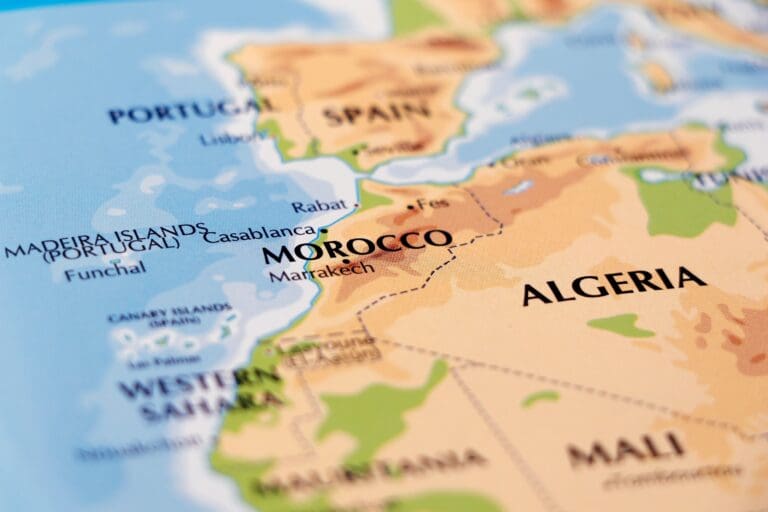
From Aleppo to Algiers:
Enterprising Syrians Bring Opportunity to Algeria
Issue Brief, June 2025
Key Takeaways
Two Waves of Migration: Syrians arrived in Algeria in two main waves: those seeking economic opportunity, prior to 2011, and those fleeing the Syrian civil war, many of whom initially saw Algeria as a transit point but have since settled semi-permanently.
A Significant Economic Engine: Despite restrictions on employment, Syrians in Algeria have become an economic force to be reckoned with, particularly through investment and entrepreneurship in sectors like textiles and restaurants.
A Liminal Existence: While many Syrians have found a degree of social integration and a welcoming environment in Algeria, their legal precarity, due to the lack of formal refugee status or secure long-term residency, leaves them in a persistent state of “liminality”—an insecure, in-between mode of existence.
A Win-Win Policy Shift: Algeria needs to move beyond ad hoc tolerance and temporary frameworks to establish clear, long-term integration policies, including secure residency and formal employment rights, to harness the full potential of its Syrian residents and align with its international commitments.
Introduction
In the wake of the Syrian conflict, Algeria has emerged as an unexpected host for tens of thousands of Syrian nationals. While it has not positioned itself as a major refugee hub, the country today is home to an estimated 50,000 Syrians, a significant population that has shifted from viewing Algeria as a transit point to embracing it as a place of long-term residence.1
The neighborhood of Baba Hassan in Algiers—now colloquially known as “Baba Haleb” (Aleppo in Arabic) or “Bab Al-Hara,” a nod to the popular Syrian television series—is emblematic of this transformation. Prior to 2011, Baba Hassan was characterized by its tranquil atmosphere, sparsely distributed shops, and elegant villas. Today, the suburb pulsates with the energy of its established Syrian community. The Syrian accent permeates the area, and Syrian-owned businesses—textile shops, sweet shops, and restaurants—dominate the commercial landscape. This transformation is evident not only in other Algiers suburbs, such as Bordj El Kiffan and Douaouda Marine, but also in other Algerian cities, including Oran and Relizane, where Syrian communities have settled and influenced local development.
Despite their initial intentions of using Algeria as a transit point to Europe, and in the face of considerable Algerian legal obstacles including a prohibition on formal employment, Syrians have established deep roots here. Many have chosen to remain even after the fall of the Assad regime in December 2024. Fifteen interviews conducted in Algiers in March-April 2025 revealed a strong sentiment against returning to Syria in the foreseeable future. While acknowledging the potential for a “new Syria” under its new leadership, most interviewees said they perceived the rebuilding and stabilization process as a long-term undertaking. As one poignantly stated, “Algeria is home now, Syria a visit.”2
This issue brief explores the experiences of Syrian migrants in Algeria, highlighting their transition from initial transit to long-term settlement. It argues that Algerian policymakers must shift from temporary legal frameworks to comprehensive integration strategies that acknowledge the permanence of this population and maximize its potential contributions. A key distinction between Algeria and other host countries like Türkiye is that while the latter offers Syrians a temporary legal status (Temporary Protection) and more structured access to public services despite significant social tensions with their hosts, Algeria currently provides a high degree of de facto social tolerance but lacks any coherent legal mechanism or formal recognition for Syrians, leaving them in a precarious legal limbo.
Their decision to remain, coupled with the legal ambiguities they face, places Syrians in a state of liminality. The current legal context is a significant challenge: while Syrians benefit from access to essential services like free education and healthcare, the prohibition on formal employment forces many into the informal sector, leaving them vulnerable. The need to renew short-term visas every 45 days, and the difficulty of obtaining long-term residency, exacerbate this precarity.
This reality necessitates a shift in Algerian policy. Indeed, there are compelling reasons for Algeria to transition from ad hoc tolerance to a structured, long-term integration framework. A primary consideration stems from the country’s existing international obligations. Algeria is a signatory to the 1951 Geneva Convention relating to the Status of Refugees and its 1967 Protocol (ratified by Decree 1963-274), as well as the 1969 OAU (Organisation of African Unity) Convention governing the specific aspects of refugee issues in Africa (ratified in 1974).3 Yet, the state neither grants widespread refugee status nor provides a comprehensive domestic legal framework for asylum seekers that aligns with these conventions. This gap contradicts its international commitments and weakens Algeria’s credibility. The reasons for this gap are complex and not officially articulated, possibly stemming from broader migration policy considerations and domestic political sensitivities. However, the consequences for Syrians are clear.
Legalizing Syrians’ presence through secure residency and regulated employment would not only improve their protection but also enable Algeria to harness their contributions more effectively and transparently, reducing the informal economy and potentially increasing tax revenue.
Another factor that significantly enhances the feasibility of such reforms is the existing social stability surrounding the Syrian presence. Unlike many other host countries, Algeria has experienced relatively little public backlash against Syrians. Interviews suggest that Syrians are largely seen as respectful, entrepreneurial, and well-integrated. This positive social dynamic creates a rare policy window for more formal integration that may not exist to the same extent elsewhere.
Addressing these legal contradictions and establishing clear pathways to secure residency is therefore crucial, both to acknowledge the permanence of this population and to maximize its meaningful contribution to its adopted home.
From Investment to Refuge: The Dual Trajectory of Syrians in Algeria
Interviews conducted with Syrian residents across Algiers reveal a nuanced picture of their resilience and strategic economic integration, a narrative marked by two distinct waves of migration. These waves, while both contributing to Algeria’s evolving social fabric, have distinct implications for the challenges and opportunities of long-term integration policy.
The initial wave of Syrian migrants arrived primarily during the first two terms of late president Abdelaziz Bouteflika (1999-2009)—a period of relative political and economic stability in both Syria and Algeria. They were largely driven by the pursuit of economic opportunities. This cohort often arrived with substantial financial resources, indicating a deliberate strategy for investment and business expansion within Algeria’s burgeoning market. They were primarily entrepreneurs and investors seeking to capitalize on Algeria’s economic growth, fueled by increased oil revenues and government investment in infrastructure, and to establish early community networks.
During that economic boom, the Algerian government invested heavily in large-scale infrastructure projects, creating opportunities for skilled professionals and investors. Syrian contracting firms like El-Bayrak4 and El Rawasi5 leveraged their established capital and expertise to secure construction contracts, playing significant roles in Algeria’s infrastructure development. Their projects spanned a wide range of sectors, including residential and commercial buildings, road and bridge construction, water and sewage systems, and specialized projects within the oil and gas industry. While these firms were required to operate with a local partner, it was their business acumen, technical proficiency, and good professional reputation that allowed them to compete with Chinese and Turkish contractors. This growing economic influence is evident in official Algerian statistics from the end of 2021, which show Syrian companies as the third-biggest source of foreign investment, with an 11% share, behind Turkish and French companies.6
The Syrian civil war, which began in 2011, triggered the second wave, consisting mostly of refugees and asylum seekers escaping violence, political persecution, or economic collapse. Many in this group initially viewed Algeria as a transit country en route to Europe, but many ended up settling there longer-term. From 2011 to late 2014, Syrians could enter Algeria without a visa, which, combined with Algeria’s proximity to Europe, presented a significant opportunity for migration.7 It’s important to note that while some Syrians were initially housed in camps, the vast majority of the Syrian community in Algeria today lives outside these camps and has achieved a degree of economic stability and comfortable living conditions.
While comprehensive demographic data is limited, interviews and available literature suggest this wave largely, though not exclusively, comprised middle to upper-middle class Syrians with professional skills and/or education (or degrees finished in Algeria), who were seeking refuge from the war. Many confessed that they found an opportunity where they least expected it. Sireen, a 38-year-old mother of three, explained, “we had limited knowledge of Algeria and did not intend to remain. But we ultimately stayed, invested our resources, and established families here.”8 This sentiment of unexpected settlement was echoed by others. Bilal, a sweet shop owner, said: “Algeria was an accidental haven,”9 a place where they found unexpected refuge and opportunity.
Interviews indicated that the expectations of many respondents, including those with professional skills, were largely met. The skills needed were not significantly different from those in Syria. Several interviewees emphasized Algeria’s untapped business potential, describing it as a market with many sectors yet to be filled, ideal for ventures in food and textiles. As a result, this cohort focused on establishing small to medium-sized enterprises.
This strategic approach minimized competition and facilitated smoother integration. They concentrated on sectors such as textiles workshops, retail outlets, sweet shops, and restaurants offering Syrian cuisine that quickly gained popularity. This focus on niche markets, combined with their economic means, contributed to a relatively harmonious integration, mitigating potential resentment.
The influx of Syrians in these sectors has had a notable impact. Syrian entrepreneurs created employment opportunities for Algerians and diversified the market. Notably, official data from 2017 indicated the Syrian community ranked second among foreigners in terms of the number of companies they owned in Algeria (1,188 companies), and journalistic reports suggest that Syrian individual traders have played a leading role among foreign merchants, representing a significant portion of this market segment.10 Moreover, Syrian individual traders have also taken on a leading role among foreign merchants in Algeria, representing a significant 30% of the market.11
Despite their entrepreneurial spirit, the legal prohibition on formal employment, coupled with bureaucratic hurdles, creates obstacles. These ongoing challenges require urgent policy attention.
Time for a New Legal Framework
The prohibition on Syrians seeking formal employment remains a significant obstacle. It forces most into the informal economy,12 which lacks social security and labor rights. Faced with these constraints, Syrians have adopted various strategies, including independent contracting and forming partnerships through marriage or business arrangements with Algerian citizens. This practice, commonly known as the “Algerian front,” involves using an Algerian citizen’s name or ownership as a facade for Syrian business activities, enabling operations despite legal restrictions. As evidenced by many accounts, this system underscores the legal constraints they face.
These informal arrangements, while providing income, leave Syrian workers vulnerable. As Ibrahim, a textile shop owner, explained, “I trust my Algerian partners, but I’ve heard awful stories. I do not own my car… my Algerian partner bought it for me.”13
These vulnerabilities are compounded by complex administrative procedures. Since 2011, Algeria has provided refuge to Syrians, initially under a temporary 90-day visa. Today, Syrians must extend visas every 45 days, a bureaucratic burden hindering long-term residency. While enjoying freedom of movement, the absence of an effective legal framework for asylum seekers means they remain formally classified as irregular migrants. This creates a core paradox: they benefit from social services yet lack formal recognition and the documentation needed for legal employment.
Despite the legal ambiguity, Syrians have been able to mitigate these legal constraints and their emotional loss through their skills, work ethic, and entrepreneurship.14 A tangible sense of well-being pervades their lives. Their quality of life contrasts sharply with the chaos they left behind and difficulties their relatives face in Türkiye, Lebanon, Jordan or Germany—countries where interviewees describe relatives facing anti-Syrian sentiment, precarious legal situations, and economic hardship, leading some to regret leaving Algeria. The welcoming Algerian society is a recurring theme.
Yet this comfortable existence is perpetually undercut by a sense of liminality – a state of being in-between, neither fully settled nor fully detached.15 This complex reality is illustrated by Nadim, who explained, “Our lives are good here. Where could we afford a life like this right now? But again, we have been living en attente (as expressed in French during the interview),”16 a sentiment echoed in all the interviews. Abu Ali’s words further emphasize this: “We all came for a moment and found a lifetime… I have been here already a decade, I love it here, but I have been living constantly in waiting…”17.
This liminality is about a sense of living between two worlds, but also is about status, identity and the security of one’s place within a social and legal order. The 45-day visa renewal creates a state of perpetual temporariness. Even if their daily lives are relatively stable, their future is not. This constant cycle of renewal prevents them from fully putting down roots, investing in long-term plans, and developing a secure sense of belonging.
This duality is a constant undercurrent. As most interviewees often noted, “our situation here is better,” a comparison that underscores the relative stability and opportunity they’ve carved out in Algeria. Yet “better” is not synonymous with “secure,” and while Syrians’ economic contribution is welcomed, this does not translate into legal certainty. This paradox of a comfortable life lived in a state of legal limbo creates a unique and often challenging existence. Syrians have found a home, a community, and a measure of prosperity, yet they remain suspended, neither fully integrated nor fully detached. While the pragmatic leniency of Algerian authorities offers a degree of flexibility, it does little to alleviate this underlying insecurity.
The Questionable Pull of the New Syria
Interviews reveal a complex interplay of hope and pragmatism regarding a “new Syria” under President Ahmed El Sharaa’s leadership. Nadim said: “I want to see my country recover… but again, my life is here. Algeria is home and I cannot leave it.”18
A significant shift in belonging is evident. The tangible benefits of being in Algeria outweigh concerns over legal limbo. Interviewees repeatedly mentioned positive integration and acceptance, alongside detachment from an unfamiliar Syria. Safi, a restaurant owner, explained, “Our lives are comfortable… (we will) visit Syria for sure, but returning permanently is out of question.”19
such as the need for reliable hospitals and schools. Interviewees widely perceived that Syria would be unable to provide these adequately within two to five years. This is more than wariness; it is a testament to the profound emotional and physical toll of displacement, and the desire for the stability and peace that Algeria now represents – factors that heavily influence their decision to remain.
Interviews revealed a recurring “five years minimum” sentiment which reflected what appears to be a calculated appraisal of Syria’s reconstruction. This timeframe represented interviewees assessment of the time needed for Syria to rebuild its infrastructure, economy, and social fabric. This pragmatism is further emphasized by the reluctance to jeopardize their current stability for an uncertain future in Syria. Hala, a 33-year-old mother of three, explained: “Hope for Syria is there, but I will not gamble what I built in Algeria on it…. I will wait and see. We will see in five years.”20
The intergenerational aspect further solidifies their decision. Children raised in Algeria have formed deep roots, making a return to Syria a daunting prospect. As a 36-year-old mother of four, with two children born in Algeria and two who arrived at a very young age, explained, “Born and raised here, they know only this life. Syria’s current conditions would be a stark and difficult adjustment… Syria, as it is now, would be a foreign land to me, let alone to them.”21
Many young Syrians, working as apprentices in restaurants and textile shops, who arrived young in Algeria or were born there, described themselves as “Algerian-Syrian.” This illustrates the creation of hybrid identities and the challenges of reintegration into a Syria that has become unfamiliar. Their linguistic abilities—fluency in Algerian Arabic and French alongside Syrian Arabic—powerfully symbolize their dual belonging.
Ultimately, many interviewees perceived their decision to remain in Algeria as irreversible. The lack of a clear pathway for return, coupled with the difficulty of re-entry in Algeria, creates a sense of permanent displacement. As one interviewee observed, “We can leave, but we cannot come back.”22 This reality highlights the precarious position of Syrians, caught between a homeland in crisis and a host country that, while providing a degree of stability, offers no clear path to future mobility.
Syrians’ decision to remain in Algeria is a pragmatic one. They are not abandoning their homeland, but choosing stability and opportunity over uncertainty and hardship. The Algerian government must recognize this reality and develop policies that address the long-term integration of this community.
Conclusion: From Liminality to Shared Belonging
The experiences of Syrians in Algeria offer valuable lessons for policymakers navigating the complexities of protracted displacement. While the country’s initial response focused on providing refuge and basic services, the long-term reality demands a fundamental shift towards comprehensive integration strategies. Algeria has benefited from the economic contributions and cultural enrichment brought by Syrian communities, yet the persistence of their legal limbo undermines both the well-being of these individuals and their full potential to contribute to Algerian society.
Algerian policymakers must prioritize clear, accessible pathways to securing permanent residency. The interviews for this study revealed a strong preference among Syrians to remain in Algeria long-term, with limited desire to return to Syria. Providing secure residency would give them the stability they need to plan their futures, invest in their communities, and participate fully in the formal economy. The ability to travel more freely between Syria and Algeria during any transition phase in Syria could also represent a win for both sides, allowing Algeria to foster economic and social ties with a new Syria.
Furthermore, addressing the prohibition on formal employment is crucial. Creating legal avenues for Syrians to work would reduce exploitation, ensure labor rights, and harness their skills, offering a framework of dignity and belonging.
Ultimately, the integration of Syrians in Algeria is not merely a humanitarian imperative; it is a strategic opportunity. By adopting forward-thinking policies that promote inclusion and recognize the evolving identity of its Syrian residents, Algeria can strengthen its economy, diversify its society, and foster a more resilient future, one that moves beyond liminality toward shared belonging.




